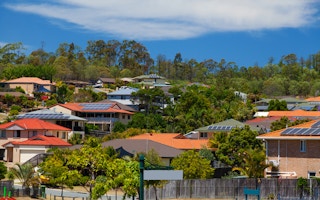Soaring electricity prices, high solar panel uptake and plenty of sunshine are pushing Australia to the forefront of a solar battery storage revolution driven by Silicon Valley firms like Tesla Motors Inc and Enphase.
But Australia’s political roller coaster, which has seen prime ministers dumped four times in the past three years, largely over climate policy, is hampering the battle against climate change and investment in clean energy.
Prime Minister Malcolm Turnbull will face intense scrutiny at the upcoming global climate change summit in Paris for signs of a shift from the man he replaced in a September party coup, climate sceptic Tony Abbott.
While some believe Turnbull can convince his conservative coalition their fossil-fuel reliant economy must change to meet emissions reduction targets at Paris and beyond, their faith is tempered by realism.
“The guy leading the country and leading the Liberal Party is no longer an absolute climate sceptic but somebody who understands the principles,” Nathan Dunn, Asia-Pacific managing director for green energy company Enphase Energy, told Reuters.
“It will take some time for his thought process to permeate the rest of the party and the government itself, but it’s the first step.”
Close to 200 nations are set to meet in Paris from Nov. 30-Dec. 11, hoping to forge a pact to slow man-made climate change by weaning countries off fossil fuels.
Although the world’s largest exporter of coal and iron ore pledged to cut emissions by 26-28 per cent of 2005 levels by 2030 ahead of the Paris talks, Abbott’s Direct Action plan to achieve that has been pilloried by activists and economists.
Turnbull, who had been a vocal critic of Direct Action, has reason to fear abandoning it in favour of deeper reforms; in 2009 he was ousted as party leader by conservatives over support for an emissions trading scheme.
In fact, the conservative National Party, half of Turnbull’s ruling coalition, made support for his leadership coup contingent partly on retaining Abbott’s climate policies, and he has shown no sign yet of tempting political fate.
Senator Chris Back, a member of Turnbull’s Liberal Party and vocal climate change sceptic, doubts there will be any change to targets Australia pledged for Paris or a shift after elections set for next year, regardless of his mandate.
“One thing about Malcolm Turnbull is he’s no fool,” he told Reuters. “He’s very happy to be in the position he’s in today, and I don’t think he wants to do anything to jeopardize that position.”
Rooftop panels proliferate
Australia has become a leader in solar storage, among the most promising recent developments in consumer green technology, with little federal government support, industry experts said.
Tesla in May announced storage systems for homes, companies and utilities that could become part of a fossil-fuel-free lifestyle in which people can use rooftop solar to power homes and recharge electric car batteries.
Australia has been chosen as one of the launch countries for its flagship battery product, Powerwall, which debuts in Q4 2015. Enphase’s plug-and-play battery will arrive in 2016.
Both companies cited high electricity prices, a sunny climate, falling solar panel costs and a phasing out of payments to consumers for selling excess power as reasons to prioritise Australia.
More than 15 per cent of Australia’s 8.4 million households have rooftop solar technology, the world’s highest per capita penetration, figures from the Energy Supply Association of Australia show.
Electricity prices have soared over the past decade, while battery costs fell an average of 14 percent a year between 2007 and 2014, said Australia’s independent Climate Commission.
Economically, the arrival of storage technology for solar panels represents a sea change, says Bruce Mountain, director of energy consultancy CME.
“It changes things on their head, essentially because it enables people to use inexpensive locally-produced energy.”
King coal
Solar provides 2 per cent of the energy mix in Australia, the highest in the world, but a fraction of the 73 per cent provided by coal.
Although Enphase’s Dunn is confident that high electricity prices, economies of scale and technological advances will support his business model, he would like to see some support from Turnbull and the federal government.
“If the fossil fuel industry in getting A$10 billion a year to subsidize the work that they do, the big question is why would you not focus that kind of resource from a renewables perspective?” Dunn said.
The country’s two biggest carbon polluters, AGL Energy Ltd and Origin Energy Ltd, have shown signs they are aware of the trend, which puts at risk some of their A$22 billion ($15.6 billion) a year combined sales.
Both have begun selling solar batteries, but, according to advocacy group Market Matters, only 9 per cent of AGL’s energy production is renewable, while Origin Energy is zero per cent.










